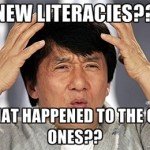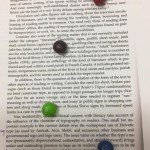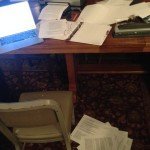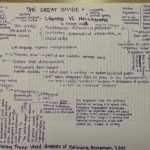
Meredith Murrietta: The Rise of Writing (chapter 3)
Brandt starts out the 3rd chapter, “Occupation: Author” with the task of trying to differentiate between a reading-based literacy and a writing-based literacy. She claims that writing has taken a shadow to reading with regards to importance in our culture. Brandt seeks to argue that writing-based literacy is its own and does not necessarily stem from, rely on, or play second fiddle to reading. On page 96, Brandt discusses the concept of writing over reading. She stated that her research participants “would abandon the expected duties and pleasures of reading and begin writing in their minds as they sat over a text written by someone else,” and that this act “requires deliberate separation from the rules of reading.”
Although I can respect Brandt’s research and theories, I cannot personally relate to them and thus have a differing view. Brandt says that “learning to read is an expectation and a rite of passage for children in this society. But the idea ofbeing or becoming a writer has more profound aspirational power” (98). I couldn’t disagree more in my own walk. I found (and find) reading to be the motivation behind my reading-based literacy. I love to soak up information, to experience that lightbulb moment when reading others words. When it comes to my own writing, I hit constant roadblocks. I shared with the class about a webinar I recently attended through work, and how the speakers of “Thriving in Chaos” started out discussing brain research and how our brains react. The first priority of the brain is safety. If the brain does not feel safe, it will not progress past the first priority. It will be looking for ways to get back into safety. Fears, anxieties, etc. can cause the brain to lag in this danger zone. Unfortunately, if you are living in this state of fear, then you wont make it past the first priority on to the second, which is experiencing “something interesting”. This was a big wake-up call for me in all aspects of my life, and in this case, my writing. As I had discussed in my earlier blog post, there is fear of judgement when it comes to my writing. I believe this fear has hindered my ability to effectively write. We see this in many examples through this chapter with Brandt’s research participants. Whether it be individuals not posting on social media for fear of the implications, or a daughter who does not want her family to find her diary: the consequences of writing can absolutely cause hindrance.
On the flip side, I thoroughly enjoy my reading-based literacy, not only because I don’t feel hindered, but also because the words I read and apply from others have significantly changed the courses and actions of my life. Towards the end of the chapter, Brandt states that “what matters in writing is its rhetorical value, its projective and transactional value, its effect on others. Even in writing, then, reading is what counts” (128). Ultimately, as we have seen quite often as a foundational piece in literacy, it comes back to the human connection. Literacy is built and truly sustained through social means (even if not explicitly social). As readers and writers, we are communicating. We both have something to gain from this interaction.
Several other questions were raised in class, the following are a few:
-If our culture really values reading more than writing, why is it that we pay writers and call that an occupation?
-Do boundaries in writing, or being told to write, take anything away from creative writers?
-Is there really a difference between writing masters and writing sponsors?




